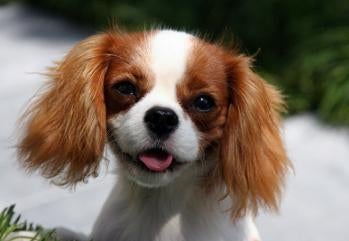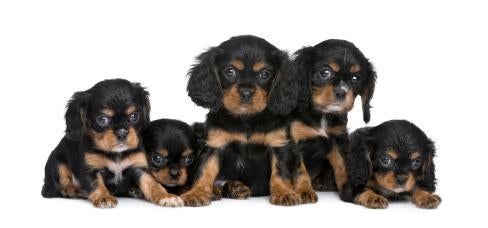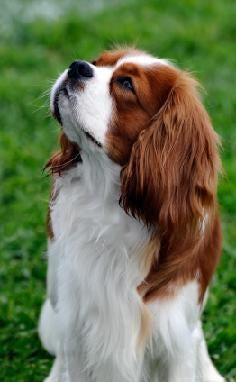Cavalier King Charles Spaniel Breed Information & Training
Perhaps you've heard of this sweet and carefree breed before, or maybe you remember "Elizabeth Taylor" as Charlotte's dog on Sex and the City. Or maybe you've been lucky enough to meet one in person!
If you have, then you know the irresistible power that this little dog holds in his big, brown eyes. If you want a smaller dog that loves kids and will be a cuddle companion unparalleled, perhaps you should think about making friends with pure love in the form of a Cavalier King Charles Spaniel.

[google_ad:DOTR_CMS_468x60_InArticle1]
History Of Cavalier King Charles Spaniels
Cavaliers are descended from the toy spaniels so well loved by royalty in the sixteenth, seventeenth, and eighteenth centuries. These sharp nosed, flat-headed spaniels can be seen in many paintings of the time, by such artists as Titian, Van Dyck, Reynolds, and Romney. These spaniels became very popular during the reign of the Stuarts. King Charles II was so enamored with his dogs that he decreed that they be allowed in any public place. This meant that dogs were even allowed in Parliament, a definite first for the time.These early spaniels were a bit leaner of limb and pointier of nose than the Cavaliers we know and love today. This is because as time went on the flat nosed Pug and Japanese Chin became the popular dogs of the day. As a result the spaniels were bred with these dogs and the English Toy Spaniel (a kissing cousin of the Cavalier) emerged. These spaniels, sometimes called "Charlies" are flatter of face and rounder of head than a Cavalier, traits showing their descent from Pugs and Chins.
In the 1920's American dog lover Roswell Eldridge offered a 25 pound prize to the person who could breed a spaniel with a longer nose, like those shown in the paintings of old. From the short snouted English Toy Spaniel longer nose specimens were selectively bred, delivering us the Cavalier King Charles Spaniel.
Appearance Of The Cav
Cavaliers are one of the largest members of the toy group. They are usually 10-13 inches in height, and weigh 10-18 pounds. They have flatter heads and longer snouts then their English Toy Spaniel cousins. Their eyes should be large and round, but not too prominent (the "bug-eyed" effect). Their ears are set high, and flop down the length of their faces.A Cavalier's coat is a marvelous thing if taken care of properly. They are a long haired breed, with straight to slightly wavy coats. Long feathers of fur adorn their tails and ears.
When a Cavalier runs it holds it's tail aloft, letting the tail hairs stream behind. In some ways it almost resembles an Arabian horse running. Because a Cavalier's coat is made up of many very fine and very long hairs, they require daily brushing, the lack of which can cause tangles and mats to form. There are four recognized Cavalier colors. A Blenheim is one of the most popular color combinations. Blenheims are a mixture of red mottled on a white background. Tri-colors are also very fetching, incorporating black, tan, and white into their color schemes. Black and tan Cavaliers are usually black throughout with tan markings on their chest and face. Finally we come to the rubies, who are a rich red color throughout.
Though Cavaliers may require a bit of care in order to maintain a decent appearance, a well groomed Cavalier is a breathtaking dog.

Cavalier King Charles Spaniel Health
Cavaliers generally have a lifespan that lasts 9-14 years. As a breed though, they have certain genetic health problems which can shorten this expected span. As such it is important to find a Cav breeder who knows about these issues and breeds carefully to avoid them. This includes waiting to breed the dog - as some health problems only begin to surface after the first year or even two.Mitral Valve Disease
Mitral valve disease occurs when the flaps on the mitral valve of the heart begin to wear out. As blood seeps through the valve in between heartbeats a gradual murmur develops. This deterioration eventually leads to heart failure and death. This condition is extremely common with Cavaliers, in fact 50% of the breed develops a heart murmur by age 5. By age 10, it is very rare to encounter a Cavalier who does not have a heart murmur. MVD exists in all Cavalier lines, all over the world. There are medications that can help ease the condition however.Breeding guidelines have been established to try and eliminate this genetic problem in Cavaliers, but no one knows if all breeders follow these guidelines (very unlikely). It's recommended that reputable breeders breed only dogs that are 2.5 years old and are heart clear, and whose grandparents are at least 5 years old and heart clear. A responsible breeder who genuinely cares for this great breed will be more than happy to share this information with you.
Luxating Patella (Slipping Knees)
Luxating Patella is a genetic condition that affects about 20-30% of Cavalier King Charles Spaniels. In the most severe cases the dog's knee cap pops easily out of place. The severity ranges from 1 (being a tight knee) to 4 (the above mentioned). This condition usually pops up by the time the dog is 6 months old. If the severity is level 1 or 2 the dog can avoid surgery with physical therapy. Grades 3 and 4 require surgery however, in order to avoid lameness in the dog.Eye Issues
Like most other mammals Cavaliers are susceptible to eye problems. They can develop cataracts, dry eye, or even cherry eye (popping out). These concerns are small though, and not as common as MVD.Note: To give yourself the very best chance of bringing a well balanced and healthy Cavalier into your life always secure your puppy from a well respected and reputable Cavalier King Charles Spaniel breeder. When your new puppy arrives home ensure that you provide plenty of puppy socialization, exercise and a nutritious dog food diet.
Cavalier King Charles Temperament
Cavaliers are some of the friendliest, carefree dogs you will ever meet! They were bred to be companions, and are often nicknamed "love sponges". These dogs live to be around both your family, and other dogs. Cavaliers even love cats. For this reason it is very important that your Cavalier has either a person or some animal friends to hang out with during the day. But it's ok, Cavaliers even love big dogs. You can have your Great Dane and your Cavalier, and be just fine. Unlike most little dogs Cavaliers don't cower in the face of a bigger dog, instead they try to play! Keep this in mind when out in public however, because all big dogs are certainly not friendly in return.
You can have your Great Dane and your Cavalier, and be just fine. Unlike most little dogs Cavaliers don't cower in the face of a bigger dog, instead they try to play! Keep this in mind when out in public however, because all big dogs are certainly not friendly in return.
Cavaliers will also be wonderful with your children. They are not easily startled by sudden movement, and do not mind being grabbed. On the other hand it's important to keep a leash on your dog in public because some children may be afraid of dogs (yes, even these guys) and will react badly to being licked or jumped on.
One important thing to note about Cavaliers is that because they are friendly, and because they retain some of the hunting characteristics of their ancestors, they should always be kept on a leash or behind a fence. Your Cavalier sees no reason not to run out onto the road after that squirrel, or chase that postman (to love, not bite) out onto the highway with no regard for his own safety.
Training Your Cavalier King Charles Spaniel
The Cavalier is a dog often motivated by food, and with the right treat can be trained to do just about anything. Because he is so people oriented however a Cavalier does not respond well to scolding, and positive reinforcement works much better with this breed. While the Cavalier is intelligent he can sometimes be easily distracted, so it's important to work with the dog in a place without too many things going on. With consistency the Cavalier is an easily trainable dog who will respond to your commands (especially if food is involved) quickly and correctly.I recommend utilizing clicker training techniques when training your Cavalier. They respond brilliantly to this gentle, non-violent, reward based training method. You can learn everything you need to know about clicker training your Cavalier King Charles Spaniel here.
Summing Up The "Cav"
A Cavalier will be your best friend, will love you regardless of whether you make six figures, and will always be there to greet you with a kiss at the end of a hard day. Good luck finding the Cavalier of your dreams, I hope you're ready to have a second shadow!
Other pages on my site that you may be interested in:
Choosing a puppy out of a litter.
Puppy crate training step-by-step instruction.
Please consult the services of a Professional Dog Trainer, Behaviorist or Veterinarian before implementing any of the advice contained on this site.









